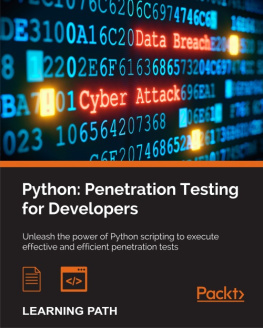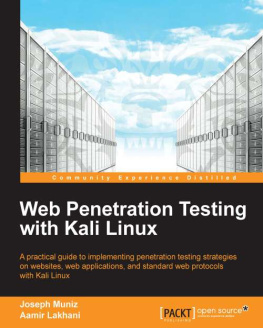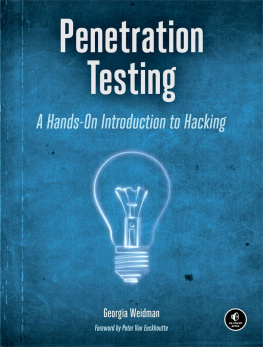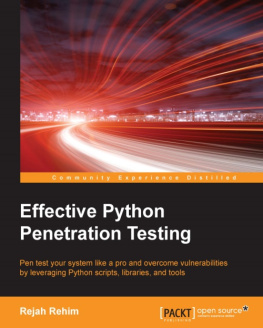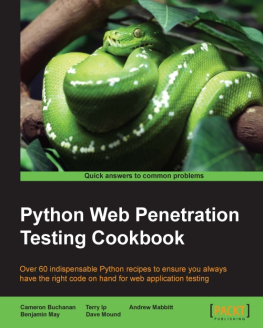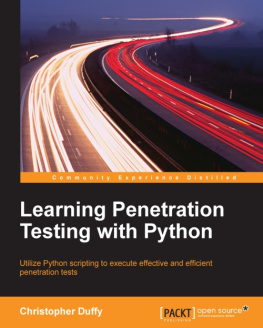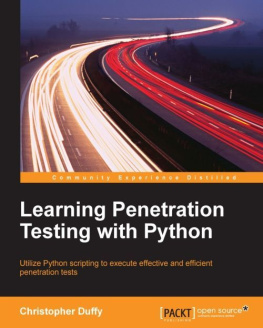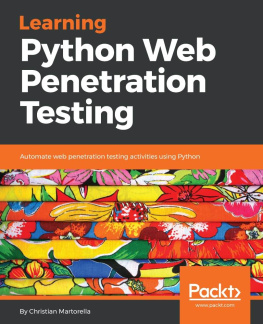Christopher Duffy et al. - Python : penetration testing for developers
Here you can read online Christopher Duffy et al. - Python : penetration testing for developers full text of the book (entire story) in english for free. Download pdf and epub, get meaning, cover and reviews about this ebook. year: 2016, publisher: Packt Publishing, genre: Computer. Description of the work, (preface) as well as reviews are available. Best literature library LitArk.com created for fans of good reading and offers a wide selection of genres:
Romance novel
Science fiction
Adventure
Detective
Science
History
Home and family
Prose
Art
Politics
Computer
Non-fiction
Religion
Business
Children
Humor
Choose a favorite category and find really read worthwhile books. Enjoy immersion in the world of imagination, feel the emotions of the characters or learn something new for yourself, make an fascinating discovery.
- Book:Python : penetration testing for developers
- Author:
- Publisher:Packt Publishing
- Genre:
- Year:2016
- Rating:4 / 5
- Favourites:Add to favourites
- Your mark:
- 80
- 1
- 2
- 3
- 4
- 5
Python : penetration testing for developers: summary, description and annotation
We offer to read an annotation, description, summary or preface (depends on what the author of the book "Python : penetration testing for developers" wrote himself). If you haven't found the necessary information about the book — write in the comments, we will try to find it.
Python : penetration testing for developers — read online for free the complete book (whole text) full work
Below is the text of the book, divided by pages. System saving the place of the last page read, allows you to conveniently read the book "Python : penetration testing for developers" online for free, without having to search again every time where you left off. Put a bookmark, and you can go to the page where you finished reading at any time.
Font size:
Interval:
Bookmark:
Unleash the power of Python scripting to execute effective and efficient penetration tests
A course in three modules

BIRMINGHAM - MUMBAI
Copyright 2016 Packt Publishing
All rights reserved. No part of this course may be reproduced, stored in a retrieval system, or transmitted in any form or by any means, without the prior written permission of the publisher, except in the case of brief quotations embedded in critical articles or reviews.
Every effort has been made in the preparation of this course to ensure the accuracy of the information presented. However, the information contained in this course is sold without warranty, either express or implied. Neither the authors, nor Packt Publishing, and its dealers and distributors will be held liable for any damages caused or alleged to be caused directly or indirectly by this course.
Packt Publishing has endeavored to provide trademark information about all of the companies and products mentioned in this course by the appropriate use of capitals. However, Packt Publishing cannot guarantee the accuracy of this information.
Published on: September 2016
Published by Packt Publishing Ltd.
Livery Place
35 Livery Street
Birmingham B3 2PB, UK.
ISBN 978-1-78712-818-7
www.packtpub.com
Authors
Christopher Duffy
Mohit
Cameron Buchanan
Terry Ip
Andrew Mabbitt
Benjamin May
Dave Mound
Reviewers
S Boominathan
Tajinder Singh Kalsi
Luke Presland
Milinda Perera
Rejah Rehim
Ishbir Singh
Sam Brown
James Burns
Rejah Rehim
Ishbir Singh
Matt Watkins
Content Development Editor
Samantha Gonsalves
Graphics
Abhinash Sahu
Production Coordinator
Aparna Bhagat
Python is a powerful new-age scripting platform that allows you to build exploits, evaluate services, automate, and link solutions with ease. Penetration testing is a practice of testing a computer system, network, or web application to find weaknesses in security that an attacker can exploit. Because of the power and flexibility offered by it, Python has become one of the most popular languages used for penetration testing.
All topics in this course have been covered in individual modules so that you develop your skill after the completion of a module and get ready for the next. Through this comprehensive course, youll learn how to use Python for pentesting techniques from scratch to finish!
The first module takes a radically different approach to teaching both penetration testing and scripting with Python, instead of highlighting how to create scripts that do the same thing as the current tools in the market, or highlighting specific types of exploits that can be written. We will explore how to approach an engagement, and see where scripting fits into an assessment and where the current tools meet the needs. This methodology will teach you not only how to go from building introductory scripts to multithreaded attack tools, but also how to assess an organization like a professional regardless of your experience level.
The second module is a practical guide that shows you the advantages of using Python for pentesting, with the help of detailed code examples. This module starts by exploring the basics of networking with Python and then proceeds to network and wireless pentesting, including information gathering and attacking. Later on, we delve into hacking the application layer, where we start by gathering information from a website, and then eventually move on to concepts related to website hacking, such as parameter tampering, DDOS, XSS, and SQL injection.
In the last leg of this course, you will be exposed to over 60 recipes for performing pentesting to ensure you always have the right code on hand for web application testing. You can put each recipe to use and perform pentesting on the go! This module is aimed at enhancing your practical knowledge of pentesting.
, Learning Penetration Testing with Python, This module takes you through how to create Python scripts that meet relative needs that can be adapted to particular situations. As chapters progress, the script examples explain new concepts to enhance your foundational knowledge, culminating with you being able to build multi-threaded security tools, link security tools together, automate reports, create custom exploits, and expand Metasploit modules. Each chapter builds on concepts and tradecraft using detailed examples in test environments that you can simulate.
, Python Penetration Testing Essentials, Over the course of this module, we delve into hacking the application layer where we start with gathering information from a website. We then move on to concepts related to website hacking such as parameter tampering, DDoS, XSS, and SQL injection. We see how to perform wireless attacks with Python programs and check live systems and distinguish between the operating system and services of a remote machine. Your concepts on pentesting will be cleared right from the basics of the client/server architecture in Python.
, Python Web Penetration Testing Cookbook, This module is an pragmatic guide that gives you an arsenal of Python scripts perfect to use or to customize your needs for each stage of the testing process. Each chapter takes you step by step through the methods of designing and modifying scripts to attack web apps. You will learn how to collect both open and hidden information from websites to further your attacks, identify vulnerabilities, perform SQL Injections, exploit cookies, and enumerate poorly configured systems. You will also discover how to crack encryption, create payloads to mimic malware, and create tools to output your findings into presentable formats for reporting to your employers. If youre a Python guru, you can look for ideas to apply your craft to penetration testing, or if you are a newbie Pythonist with some penetration testing chops, then this module serves as a perfect ending to your search for some hands-on experience in pentesting.
Module 1:
You will need a system that can support multiple Virtual Machines (VMs) that run within an industry-standard hypervisor, such as VMware Workstation (a recent version) or Virtual Box. The preferred solution is VMware Workstation running on a recent version of Windows, such as Windows 10. An Internet connection will be required to allow you to download the supporting libraries and software packages, as necessary. Each of the detailed software packages and libraries will be listed at the beginning of each chapter..
Module 2:
You will need to have Python 2.7, Apache 2.x, RHEL 5.0 or CentOS 5.0, and Kali Linux.
Module 3:
You will need Python 2.7, an Internet connection for most recipes and a good sense of humor.
If you are a Python programmer or a security researcher who has basic knowledge of Python programming and want to learn about penetration testing with the help of Python, this course is ideal for you. Even if you are new to the field of ethical hacking, this course can help you find the vulnerabilities in your system so that you are ready to tackle any kind of attack or intrusion.
Font size:
Interval:
Bookmark:
Similar books «Python : penetration testing for developers»
Look at similar books to Python : penetration testing for developers. We have selected literature similar in name and meaning in the hope of providing readers with more options to find new, interesting, not yet read works.
Discussion, reviews of the book Python : penetration testing for developers and just readers' own opinions. Leave your comments, write what you think about the work, its meaning or the main characters. Specify what exactly you liked and what you didn't like, and why you think so.

